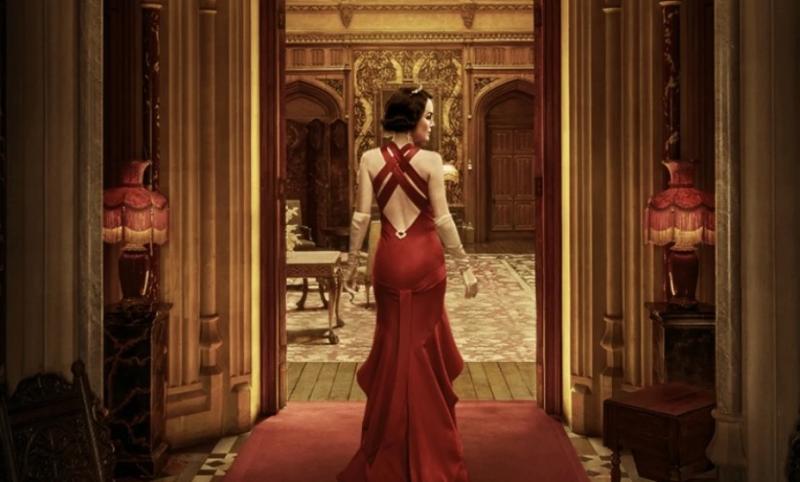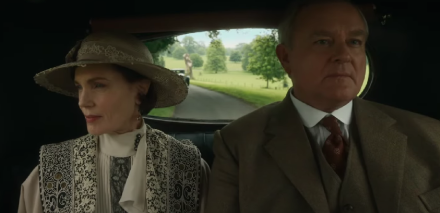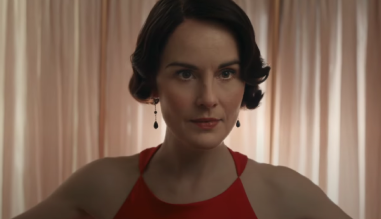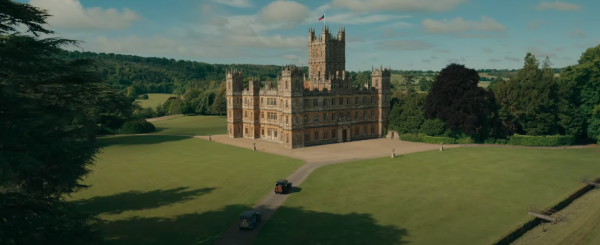Downton Abbey: The Grand Finale review - an attemptedly elegiac final chapter haunted by its past | reviews, news & interviews
Downton Abbey: The Grand Finale review - an attemptedly elegiac final chapter haunted by its past
Downton Abbey: The Grand Finale review - an attemptedly elegiac final chapter haunted by its past
Noel Coward is a welcome visitor to the insular world of the hit series

It can be a hostage to fortune to title anything “grand”, and so it proves with the last gasp of Julian Fellowes’s everyday story of posh folk at the turn of the 20th century. The Granthams are facing a lowering of their status, and it’s time to move on out.
Fellowes has just two hours to make something significant out of his plot strands, and a certain amount of corner-cutting was predictable. Exposition is pretty minimal, so good luck to anybody who didn’t give up on the series halfway through. Characters are studiously referred to by their new married names, so that relationships between them (including the dead ones, who reappear like revenants at a costume ball) must be perplexing at times.
Newcomers will be on firmer ground with Noel Coward, who opens proceedings when the Grantham household, both upstairs and downstairs representatives, go to see his Bitter-Sweet in the West End, the senior ones in the dress circle, the servant element in the tier above that, whose more restricted view of the stage director Simon Curtis amusingly provides as a marker of the divide between the two groups. Coward (Arty Froushan) makes a welcome appearance at the Abbey itself, and lends his tunes and lyrics to the soundtrack, appositely. He even gets inspiration for his next comedy from a stray remark of Lady Mary’s (Michelle Dockery, main picture). There’s a lot of nudge-nudge behaviour when he arrives in Yorkshire with former footman Mr Barrow (Robert James-Collier), now a dresser, and undresser, of the actor Guy Dexter (Dominic West), who has appeared in a screenplay written by another former servant, Mr Molesley (Kevin Doyle), who was butler to the late Violet, Dowager Duchess of Grantham, the fierce character immortalised by the late Maggie Smith.
Coward (Arty Froushan) makes a welcome appearance at the Abbey itself, and lends his tunes and lyrics to the soundtrack, appositely. He even gets inspiration for his next comedy from a stray remark of Lady Mary’s (Michelle Dockery, main picture). There’s a lot of nudge-nudge behaviour when he arrives in Yorkshire with former footman Mr Barrow (Robert James-Collier), now a dresser, and undresser, of the actor Guy Dexter (Dominic West), who has appeared in a screenplay written by another former servant, Mr Molesley (Kevin Doyle), who was butler to the late Violet, Dowager Duchess of Grantham, the fierce character immortalised by the late Maggie Smith.
Violet almost literally haunts the piece. There are references to her throughout the dialogue as characters ponder what Violet would have said to the latest act of social disruption in the family. These infractions can range from the use of the word “weekend” to Lady Mary’s divorce from unseen caddish Henry. And over the main entrance hall at Downton, an oddly garish portrait of Violet hangs forbiddingly, as if sitting in judgment over the family’s fortunes. (It makes an odd companion to what looks like a Van Dyck equestrian portrait of Charles I in one of the drawing rooms. Surely they could sell that to make ends meet?)
With cash already lacking, Cora (Elizabeth McGovern, pictured above with Hugh Bonneville as Robert Crawley) is visited by her American brother Harold (Paul Giamatti) and his financial advisor, Gus Sambrook (Alessandro Nivola), who announce that the money left to her by her late mother has been lost. The poor luvs must think the unthinkable: sell their palatial London home, Grantham House. As Lord Grantham notes, many of the capital's great palaces are now being jettisoned.
It is 1930 by now, the Wall Street crash has recently shredded fortunes and prompted suicides, the Jarrow hunger marches are waiting over the horizon. But the Granthams’ bubble stays relatively unscathed, its biggest problem Lady Mary’s new status as a divorcee. She is arguably the most “modern” member of the family, despite her cut-glass vowels, nudging her father into even more unthinkable territory and suggesting, heaven forfend, they should be cooking for themselves now. Violet would have screamed at the word “downsizing” but that’s what the Granthams face. What’s happening in the world beyond their estate isn’t mentioned in these cushioned circles.  The downstairs division might be expected to offer insights into how the other 99% live, but most of them are busy with gossiping and taking over from the retirees among the staff – Carson, the sonorous butler (Jim Carter) and Mrs Patmore, the jittery cook (Lesley Nicol) – now Mrs Mason, technically. They are also busy busting social barriers, with Daisy, the new head cook (Sophie McShera) – now Mrs Parker, technically, after marrying the new chief butler – being nominated onto the committee for the county fair.
The downstairs division might be expected to offer insights into how the other 99% live, but most of them are busy with gossiping and taking over from the retirees among the staff – Carson, the sonorous butler (Jim Carter) and Mrs Patmore, the jittery cook (Lesley Nicol) – now Mrs Mason, technically. They are also busy busting social barriers, with Daisy, the new head cook (Sophie McShera) – now Mrs Parker, technically, after marrying the new chief butler – being nominated onto the committee for the county fair.
In this social gallimaufry, a new Violet was needed, if only to give Lady Merton (Penelope Wilton) somebody to lock horns with. Fans will recall that Lady Merton was once plain Mrs Isobel Crawley, mother of the late Matthew (Dan Stevens), whose death in a car accident left Lady Mary a grieving widow. Isobel is a mischievous soul with leftist beliefs, so she is intent on making the county fair committee, on which she also sits, a hotbed for her more inclusive notions. Enter the chairman of the committee, Sir Hector Moreland, a self-important local dignitary with a livid complexion and menacing eye, played with appropriate pomposity by Simon Russell Beale in an absurd-looking hat. Ah, the Violet replacement the script needs, you think. But Fellowes gives him too few snippy outbursts, no major explosion, and then he is gone. As the film grinds on, its purpose becomes clear: it’s an elegiac tribute, but not just to Violet and her generation of stiff-backed snobs, builders of Empire whose day is long gone now; and not just to the next generation of Granthams, picking their way through the minefield of polite society before they too exit the stage. It’s more a relentlessly upbeat tribute to itself, to the splendid world of Downton Abbey the hit series and its beloved characters, who hark back to the Boer War and the great country they fought for, where the servants are grateful for their place in the scheme of things and are made to mouth pieties such as: “We all depend on each other, the way people should.” This cosy insularity was probably predictable, and It may be what devoted fans want, but I didn’t believe a word of it.
As the film grinds on, its purpose becomes clear: it’s an elegiac tribute, but not just to Violet and her generation of stiff-backed snobs, builders of Empire whose day is long gone now; and not just to the next generation of Granthams, picking their way through the minefield of polite society before they too exit the stage. It’s more a relentlessly upbeat tribute to itself, to the splendid world of Downton Abbey the hit series and its beloved characters, who hark back to the Boer War and the great country they fought for, where the servants are grateful for their place in the scheme of things and are made to mouth pieties such as: “We all depend on each other, the way people should.” This cosy insularity was probably predictable, and It may be what devoted fans want, but I didn’t believe a word of it.
The future of Arts Journalism
You can stop theartsdesk.com closing!
We urgently need financing to survive. Our fundraising drive has thus far raised £49,000 but we need to reach £100,000 or we will be forced to close. Please contribute here: https://gofund.me/c3f6033d
And if you can forward this information to anyone who might assist, we’d be grateful.

Subscribe to theartsdesk.com
Thank you for continuing to read our work on theartsdesk.com. For unlimited access to every article in its entirety, including our archive of more than 15,000 pieces, we're asking for £5 per month or £40 per year. We feel it's a very good deal, and hope you do too.
To take a subscription now simply click here.
And if you're looking for that extra gift for a friend or family member, why not treat them to a theartsdesk.com gift subscription?
more Film
 Downton Abbey: The Grand Finale review - an attemptedly elegiac final chapter haunted by its past
Noel Coward is a welcome visitor to the insular world of the hit series
Downton Abbey: The Grand Finale review - an attemptedly elegiac final chapter haunted by its past
Noel Coward is a welcome visitor to the insular world of the hit series
 Islands review - sunshine noir serves an ace
Sam Riley is the holiday resort tennis pro in over his head
Islands review - sunshine noir serves an ace
Sam Riley is the holiday resort tennis pro in over his head
 theartsdesk Q&A: actor Sam Riley on playing a washed-up loner in the thriller 'Islands'
The actor discusses his love of self-destructive characters and the problem with fame
theartsdesk Q&A: actor Sam Riley on playing a washed-up loner in the thriller 'Islands'
The actor discusses his love of self-destructive characters and the problem with fame
 Honey Don’t! review - film noir in the bright sun
A Coen brother with a blood-simple gumshoe caper
Honey Don’t! review - film noir in the bright sun
A Coen brother with a blood-simple gumshoe caper
 The Courageous review - Ophélia Kolb excels as a single mother on the edge
Jasmin Gordon's directorial debut features strong performances but leaves too much unexplained
The Courageous review - Ophélia Kolb excels as a single mother on the edge
Jasmin Gordon's directorial debut features strong performances but leaves too much unexplained
 Blu-ray: The Graduate
Post #MeToo, can Mike Nichols' second feature still lay claim to Classic Film status?
Blu-ray: The Graduate
Post #MeToo, can Mike Nichols' second feature still lay claim to Classic Film status?
 Little Trouble Girls review - masterful debut breathes new life into a girl's sexual awakening
Urska Dukic's study of a confused Catholic teenager is exquisitely realised
Little Trouble Girls review - masterful debut breathes new life into a girl's sexual awakening
Urska Dukic's study of a confused Catholic teenager is exquisitely realised
 Young Mothers review - the Dardennes explore teenage motherhood in compelling drama
Life after birth: five young mothers in Liège struggle to provide for their babies
Young Mothers review - the Dardennes explore teenage motherhood in compelling drama
Life after birth: five young mothers in Liège struggle to provide for their babies
 Blu-ray: Finis Terrae
Bleak but compelling semi-documentary, filmed on location in Brittany
Blu-ray: Finis Terrae
Bleak but compelling semi-documentary, filmed on location in Brittany
 Oslo Stories Trilogy: Sex review - sexual identity slips, hurts and heals
A quietly visionary series concludes with two chimney sweeps' awkward sexual liberation
Oslo Stories Trilogy: Sex review - sexual identity slips, hurts and heals
A quietly visionary series concludes with two chimney sweeps' awkward sexual liberation
 Sorry, Baby review - the healing power of friendship in the aftermath of sexual assault
Eva Victor writes, directs and stars in their endearing debut feature
Sorry, Baby review - the healing power of friendship in the aftermath of sexual assault
Eva Victor writes, directs and stars in their endearing debut feature
 Blu-ray: Who Wants to Kill Jessie?
Fast-paced and visually inventive Czech comedy
Blu-ray: Who Wants to Kill Jessie?
Fast-paced and visually inventive Czech comedy

Add comment